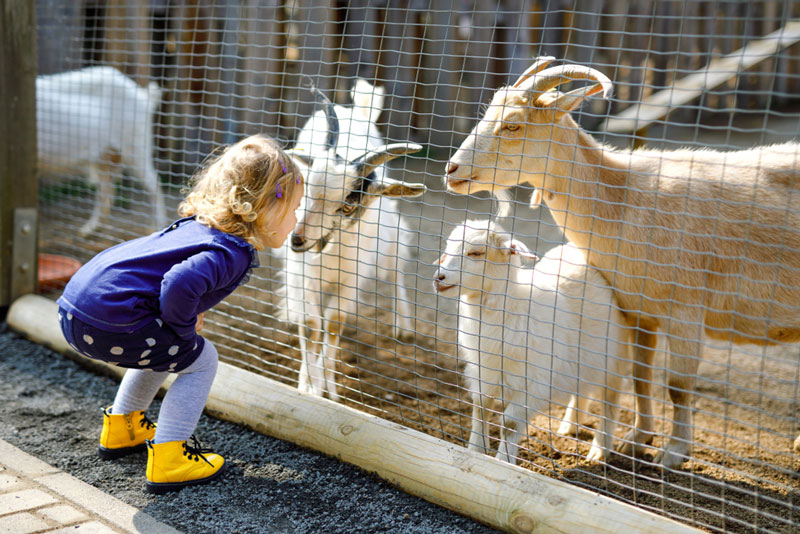Kids on the Farm: Safety Tips
Farms offer abundant fun and education for children. Unfortunately, they offer plenty of danger as well. Especially for parents who do not take certain safety precautions. While you can’t prevent all danger from the lives of your children, there are things you can do to limit their exposure to danger and minimize their risks. These are a few ways you can help protect your children from the many dangers farm living offers from heavy machinery to potentially toxic chemicals and many points in between. Follow these tips to improve the safety of your kids and keep them safe on the farm.
Educate Your Children About the Dangers of the Farm
The better your children understand the risks and dangers around them, the better prepared they are to avoid them. Just as we caution our children to look both ways before crossing the street we need to educate them about the dangers on the farm, including:
- Machinery
- Animals
- Chemicals
- Other Risks
Teach them to always exercise caution and to ask for help if they are unsure about risks or situations.
Always Supervise Your Children
Young children are especially vulnerable to risks on the farm, but you never want to leave your children unsupervised at any age. The key is to mitigate risks and avoid unnecessary risks and preventable disasters. You do this best by keeping an eye on your children at all times while they are out and about on the farm.
It is true that you can’t keep your eyes on your children at all hours of the day and night, but by providing closer supervision while they are out and about on your farm, you can help to mitigate many of the risks they may otherwise experience if unsupervised while on the farm.
Make Sure Your Children Wear Appropriate Clothing
Working farms offer plenty of risks to children. Some of these are ordinary risks that all children face, like slipping and falling. Others are unique to farms. Ensuring that your children wear appropriate clothing, including properly fitting and sturdy shoes and long pants made of sturdy, protective materials, can protect their legs and feet from various risks including sharp objects and countless other hazards. Also, remember to dress them according to the season including extra layers in fall and winter and plenty of sunscreen to protect from the relentless summer sun.
Teach Your Children to Safely Handle Tools and Equipment
 If you anticipate that your children will be using certain tools on the farm, it is wise to teach them to safely use those tools from the start. Educating your children about the proper use of tools as well as the proper care, cleaning, and storage of these tools teaches them valuable lessons today, and in the future and may actually save lives, limbs, and more along the way.
If you anticipate that your children will be using certain tools on the farm, it is wise to teach them to safely use those tools from the start. Educating your children about the proper use of tools as well as the proper care, cleaning, and storage of these tools teaches them valuable lessons today, and in the future and may actually save lives, limbs, and more along the way.
Additionally, you want to teach them to keep their fingers away from moving parts and the importance of following the manufacturer’s instructions to maximize safety and prevent injuries and accidents. One other important lesson is to remind your children about the importance of avoiding “horseplay” and practical jokes involving potentially dangerous tools, equipment, and machinery.
Keep Chemicals Out of Reach
Dangerous chemicals are best kept out of the reach of your children at all times. This works in the home and on the farm. Keep them in a locked or secured cabinet out of their reach and out of their sight. The goal is to secure all chemicals that could be harmful to your children whether if swallowed, if it gets in their eyes, or if it touches their skin. The greater the risk the chemicals represent, the more important it becomes to ensure your children do not have access to it. Even if it makes accessing these chemicals for your farm needs a little more difficult.
Keep Your Animals Under Control
It isn’t just about your keeping your animals under control but also about teaching your children to how to approach and interact with these animals safely. The more dangerous animals happen to be, whether by size or temperament, the more important it becomes to educate your children about the possible dangers. Teach children not to approach certain animals on your farm without adult supervision.
Additionally, not all animals on your farm are of your farm. Teach children the risks that wild animals, such as coyotes, snakes, hawks, etc. represent. Children need to know what to look for and how to respond (mostly by getting adult attention quickly) when faced with potentially dangerous farm and non-farm animals.
Keep a First Aid Kit on Hand
Prevention is always the preferred course, but accidents and injuries do happen. In those instances, you want to be prepared with a fully stocked first aid kit. Especially important to keep in these kits are the following types of items:
- Disinfectants
- Bandages
- Basic medical supplies
- Heavy-duty scissors
- Ice packs
- Hand sanitizer
- Bottled water
Ideally, you’ll have several first aid kits located in easily accessible locations throughout your farm, including your home, vehicles, and various outbuildings. If your children have specific health concerns, such as allergic reactions or diabetes to consider, keep items in the first aid kit that address these risks, too.
Your children are important to you. By taking proper safety precautions, including those listed above, you can help ensure your farm is not only a wonderland of fun for your children to explore, but also a place of safety and learning for them as well.



